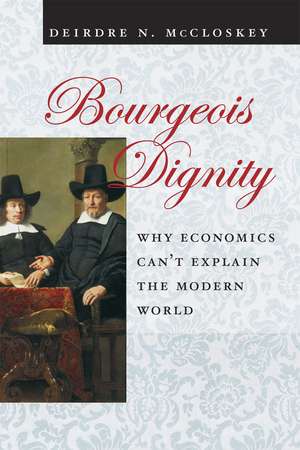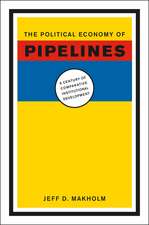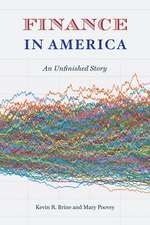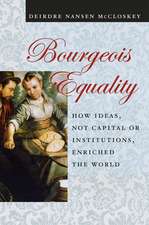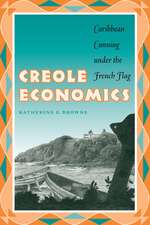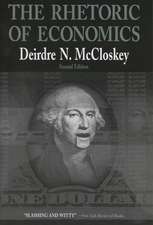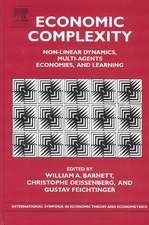Bourgeois Dignity: Why Economics Can't Explain the Modern World
Autor Deirdre Nansen McCloskeyen Limba Engleză Paperback – 15 noi 2011
The big economic story of our times is not the Great Recession. It is how China and India began to embrace neoliberal ideas of economics and attributed a sense of dignity and liberty to the bourgeoisie they had denied for so long. The result was an explosion in economic growth and proof that economic change depends less on foreign trade, investment, or material causes, and a whole lot more on ideas and what people believe.
Or so says Deirdre N. McCloskey in Bourgeois Dignity, a fiercely contrarian history that wages a similar argument about economics in the West. Here she turns her attention to seventeenth- and eighteenth-century Europe to reconsider the birth of the industrial revolution and the rise of capitalism. According to McCloskey, our modern world was not the product of new markets and innovations, but rather the result of shifting opinions about them. During this time, talk of private property, commerce, and even the bourgeoisie itself radically altered, becoming far more approving and flying in the face of prejudices several millennia old. The wealth of nations, then, didn’t grow so dramatically because of economic factors: it grew because rhetoric about markets and free enterprise finally became enthusiastic and encouraging of their inherent dignity.
An utterly fascinating sequel to her critically acclaimed book The Bourgeois Virtues, Bourgeois Dignity is a feast of intellectual riches from one of our most spirited and ambitious historians—a work that will forever change our understanding of how the power of persuasion shapes our economic lives.
Or so says Deirdre N. McCloskey in Bourgeois Dignity, a fiercely contrarian history that wages a similar argument about economics in the West. Here she turns her attention to seventeenth- and eighteenth-century Europe to reconsider the birth of the industrial revolution and the rise of capitalism. According to McCloskey, our modern world was not the product of new markets and innovations, but rather the result of shifting opinions about them. During this time, talk of private property, commerce, and even the bourgeoisie itself radically altered, becoming far more approving and flying in the face of prejudices several millennia old. The wealth of nations, then, didn’t grow so dramatically because of economic factors: it grew because rhetoric about markets and free enterprise finally became enthusiastic and encouraging of their inherent dignity.
An utterly fascinating sequel to her critically acclaimed book The Bourgeois Virtues, Bourgeois Dignity is a feast of intellectual riches from one of our most spirited and ambitious historians—a work that will forever change our understanding of how the power of persuasion shapes our economic lives.
| Toate formatele și edițiile | Preț | Express |
|---|---|---|
| Paperback (1) | 166.38 lei 3-5 săpt. | +29.63 lei 7-13 zile |
| University of Chicago Press – 15 noi 2011 | 166.38 lei 3-5 săpt. | +29.63 lei 7-13 zile |
| Hardback (1) | 444.15 lei 6-8 săpt. | |
| University of Chicago Press – 30 noi 2010 | 444.15 lei 6-8 săpt. |
Preț: 166.38 lei
Nou
Puncte Express: 250
Preț estimativ în valută:
31.84€ • 33.24$ • 26.35£
31.84€ • 33.24$ • 26.35£
Carte disponibilă
Livrare economică 15-29 martie
Livrare express 01-07 martie pentru 39.62 lei
Preluare comenzi: 021 569.72.76
Specificații
ISBN-13: 9780226556741
ISBN-10: 0226556743
Pagini: 592
Ilustrații: 2 line drawings, 3 tables
Dimensiuni: 152 x 229 x 38 mm
Greutate: 0.77 kg
Editura: University of Chicago Press
Colecția University of Chicago Press
ISBN-10: 0226556743
Pagini: 592
Ilustrații: 2 line drawings, 3 tables
Dimensiuni: 152 x 229 x 38 mm
Greutate: 0.77 kg
Editura: University of Chicago Press
Colecția University of Chicago Press
Notă biografică
Deirdre N. McCloskey is Distinguished Professor of Economics, History, English, and Communication at the University of Illinois at Chicago. Among her many books are The Bourgeois Virtues: Ethics for an Age of Commerce; Crossing: A Memoir; The Secret Sins of Economics; and If You’re So Smart: The Narrative of Economic Expertise, all published by the University of Chicago Press.
Cuprins
Preface and Acknowledgments
1 The Modern World Was an Economic Tide, But Did Not Have Economic Causes.
2 Liberal Ideas Caused the Innovation
3 And a New Rhetoric Protected the Ideas.
4 Many Other Plausible Stories Don’t Work Very Well.
5 The Correct Story Praises “Capitalism.”
6 Modern Growth Was a Factor of at Least Sixteen.
7 Increasing Scope, Not Pot-of-Pleasure “Happiness,” Is What Mattered,
8 And the Poor Won.
9 Creative Destruction Can Be Justified Therefore on Utilitarian Grounds.
10 British Economists Did Not Recognize the Tide,
11 But the Figures Tell.
12 Britain’s (and Europe’s) Lead Was an Episode,
13 And Followers Could Leap over Stages.
14 The Tide Didn’t Happen because of Thrift;
15 Capital Fundamentalism Is Wrong.
16 A Rise of Greed or of a Protestant Ethic Didn’t Happen;
17 “Endless” Accumulation Does Not Typify the Modern World.
18 Nor Was the Cause Original Accumulation or a Sin of Expropriation.
19 Nor Was It Accumulation of Human Capital, Until Lately.
20 Transport or Other Domestic Reshufflings Didn’t Cause It,
21 Nor Geography, nor Natural Resources;
22 Not Even Coal.
23 Foreign Trade Was Not the Cause, Though World Prices Were a Context,
24 And the Logic of Trade-as-an-Engine Is Dubious,
25 And Even the Dynamic Effects of Trade Were Small.
26 The Effects on Europe of the Slave Trade and British Imperialism Were Smaller Still,
27 And Other Exploitations, External or Internal, Were Equally Profitless to Ordinary Europeans.
28 It Was Not the Sheer Quickening of Commerce
29 Nor the Struggle over the Spoils.
30 Eugenic Materialism Doesn’t Work;
31 Neo-Darwinism Doesn’t Compute;
32 And Inheritance Fades.
33 Institutions Cannot Be Viewed Merely as Incentive-Providing Constraints,
34 And So the Better Institutions, Such as Those Alleged for 1689, Don’t Explain,
35 And Anyway the Entire Absence of Property Is Not Relevant to the Place or Period
36 And the Chronology of Property and Incentives Has Been Mismeasured,
37 And So the Routine of Max U Doesn’t Work.
38 The Cause Was Not Science,
39 But Bourgeois Dignity and Liberty Entwined with the Enlightenment.
40 It Was Not Allocation:
41 It Was Words.
42 Dignity and Liberty for Ordinary People, in Short, Were the Greatest Externalities,
43 And the Model Can Be Formalized.
44 Opposing the Bourgeoisie Hurts the Poor,
45 And the Bourgeois Era Warrants Therefore Not Political or Environmental Pessimism
46 But an Amiable, if Guarded, Optimism.
Notes
Works Cited
Recenzii
“The startling perspective McCloskey brings to the history of economics qualifies her as the Max Weber of our times. This is a wonderfully entertaining and stimulating antidote for the reigning view of Homo Economicus.”
“Over a wide range of nations and times, McCloskey advances the arresting thesis that humble ideas, especially those pertaining to the role of a bourgeois dignity, supply the spark that jumpstarts the rest of the process. Readers will be impressed with the breadth of her knowledge, the clarity of her thought, and the sophistication of this finely wrought book.”
“Deirdre McCloskey has embarked on a heroic enterprise, the wholesale reconsideration of the modern capitalist economy. The author’s lightness of touch is deeply admirable: competing hypotheses from the Protestant Ethic to technological determinism are rounded up and dispatched in a wonderfully invigorating fashion, and not the least of the many virtues of Bourgeois Dignity is the demonstration that serious argument can also be fun.”
"McCloskey's argument runs counter to the prevailing wisdom. However, readers who disagree with her thesis will surely benefit from this exceptionally well-written book, which draws on wide-ranging scholarship that extends well beyond economics proper. . . . Highly recommended."
CHOICE Outstanding Academic Title, 2011
"Bourgeois Dignity is a contrarian account of economic development that addresses and disarms its opponents. . . . McCloskey provides a useful correction to those who rely upon materialist reductive explanations to account for a complex phenomenon. For those who wish to know about how the West had economically developed and how the East may soon be, Bourgeois Dignity is the book to read."
